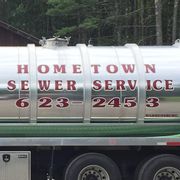
Your septic system is designed to require minimal maintenance, but it’s still important to take care of it. In particular, you need to make sure that only water, waste, and toilet paper end up in the septic tank. Avoid flushing anything else down your toilet or sink, especially the following three types of materials.
Which Materials Are Bad for Your Septic Tank?
1. Paper Towels & Absorbent Materials
While toilet paper and paper towels may seem like similar materials, toilet paper is designed to break apart when it gets wet, while paper towels are meant to absorb as much water as possible without breaking up. When paper towels get into your pipes or septic pumping equipment, they can cause clogs. The same goes for anything that absorbs water and expands, such as diapers, menstrual hygiene products, cat litter, and cotton balls.
2. Hair & Floss
 A thin strand of hair won't clog a pipe by itself, but it can easily get caught on the side of the pipe. Once it's there, it tangles other passing debris — such as other hairs — and creates an increasingly bigger clog. This can happen not only inside the pipe right below the drain, but anywhere throughout your septic system. Throw hair and floss in the trash can, not down the toilet.
A thin strand of hair won't clog a pipe by itself, but it can easily get caught on the side of the pipe. Once it's there, it tangles other passing debris — such as other hairs — and creates an increasingly bigger clog. This can happen not only inside the pipe right below the drain, but anywhere throughout your septic system. Throw hair and floss in the trash can, not down the toilet.
3. Harsh Chemicals
Inside your septic tank are colonies of bacteria that break down the waste in the tank. Chemicals can kill off the bacteria or change the balance of the tank's ecosystem. This makes it less efficient so that waste builds up more quickly, requiring more frequent septic service. Avoid using liquid drain cleaners to deal with clogs. In addition, instead of using harsh disinfecting products for bathroom and kitchen cleaning, use more gentle cleaners like vinegar.
Whether your septic tank needs routine maintenance or heavy repairs, choose Hometown Sewer Service in Warrensburg, NY. For over 70 years, they've served commercial and residential clients in Lake George and the surrounding areas as the local authority in septic tanks, sewers, and grease traps. To schedule a visit, call (518) 623-2453 or reach out online.
About the Business
Have a question? Ask the experts!
Send your question

